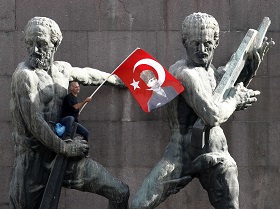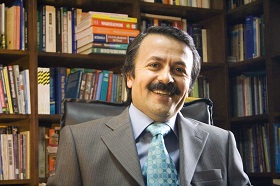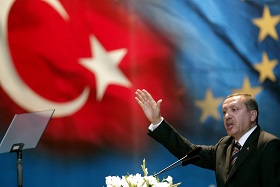Where Turkey is Heading?
Turkish protesters wave national flags with
portraits of Turkey’s founder Kemal Ataturk,
Ankara, June, 2013
(no votes) |
(0 votes) |
Since Erdogan’s Justice and Development (AK) party took office in late 2002 Turkey became more prosperous and politically mobilized. Turkey is not a full-fledged democracy yet but its government does change through the ballot box and it is definitely more democratic than it was a decade ago. Moreover, the country has come to be seen as a model for nations emerging from the Arab Spring. Despite all those achievements, the protests have shaken up the country for over three weeks. What is behind these protests and what will these protests mean for the future of democracy in Turkey? Rector and professor of Aksaray University Dr. Mustafa Acar shares his insights on the situation in Turkey.
Interview
Since Erdogan’s Justice and Development (AK) party took office in late 2002 Turkey became more prosperous and politically mobilized. Turkey is not a full-fledged democracy yet but its government does change through the ballot box and it is definitely more democratic than it was a decade ago. Moreover, the country has come to be seen as a model for nations emerging from the Arab Spring. Despite all those achievements, the protests have shaken up the country for over three weeks. What is behind these protests and what will these protests mean for the future of democracy in Turkey? Rector and professor of Aksaray University Dr. Mustafa Acar shares his insights on the situation in Turkey.
Interviewee: Mustafa Acar, Rector and Professor of Aksaray University, Turkey
Interviewer: Maria Prosviryakova, Russian International Affairs Council
How are the uprisings in Turkey different from or similar to the Arab Spring uprisings?
They are totally different. It is a mistake to draw a parallel between them because Turkey is a democratic country that has democratically elected president, prime minister, government and parliament (Meclis), whereas there were no democratic, free and just elections in the Arab countries. They were dictatorships that had no hope for a change of the government through democratic means. Turkish people had a chance to change their rulers for several times in the last decade, and will soon have another chance to do so – in 2014 municipal elections will take place and also Turkish president will be for the first time elected by the citizens through a public vote; in 2015 parliamentary elections will be held.
Also, macroeconomic indicators (unemployment, growth, per capita income, foreign exchange reserves, investments, foreign debts, etc.) in the Arab countries were very bad at the time of the protests there. On the contrary, Turkey has been the shining star in the region in recent years. Economic indicators improved dramatically under Erdogan’s government. Despite the negative effects of the global economic crisis, Turkish economy is now very strong and much better than it was a decade ago. Turkey is now the 17th largest economy in the world and the 6th largest economy in the EU. From 2001 to 2012, Turkey’s GDP increased 5-fold jumping from 150 to 790 billion dollars, per capita income increased almost 4-fold jumping from 3000 to nearly 11000 dollars, inflation has fallen from 67 to 6.5%, real interest rates are almost zero%, exports jumped from 25 to 152 billion dollars, annual average growth rate has been around 6% in the same period. As of January 2013 Turkey’s unemployment rate has been around 8.4% which is lower than in many developed European countries. Unlike many EU member states that have a huge budget deficits, Turkey has a budget surplus, and it has cleared its external debts to the IMF.
So, the context of the protests in Turkey is totally different from the Arab Spring uprisings. People in the Arab streets asked for freedom, social justice and dignity; on the contrary, the Turkish people gained freedom, social justice, self-confidence and dignity under Erdogan’s leadership.
Well, Erdogan has done a lot for his country. Since his Justice and Development (AK) party took office in late 2002, the Turkish economy has grown significantly and Turkey has become an influential actor in the Middle East. The country is more prosperous in all respects. What is it then that is causing major dissatisfaction with Erdogan’s rule?
To make a long story short, we can say that these protests have three dimensions: 1) environmentalist, social concerns, 2) dissatisfaction of the “interest lobby” and the “losers” of the new Turkey, and 3) growing concerns of the big international players over Turkey’s regional power aspirations.
The first dimension has innocent dynamics. It encompasses environmentalists, groups of people that are unhappy about Erdogan’s leadership style and also people who express concerns over government meddling in their lives (e.g. tendency towards banning abortion; calling for families to have at least three kids; new regulations on selling alcoholic beverages; declaring “ayran” - a yogurt-based beverage - as Turkish national drink; raising a “religious youth” etc.). This dimension of protests should be accepted as part of a well-functioning democracy - as normal, legitimate, democratic demands. If people have certain concerns, they have all the right to protest and raise their voice.
The second and third dimensions are clearly illegal, illegitimate, violent and seemingly an “organized operation” with an aim to force Erdogan to resign and to make his government collapse, hence creating a chaotic, politically instable environment. It is a collective effort of marginal, ultra-leftist groups, interest lobby, big capitalists with vested interests, and external players. Let me explain briefly.
Combined with late Mr. Ozal’s reforms in the 1980s, Erdogan’s rule since 2002 have changed the country’s economic and political structure quite a lot. Political structure has evolved from being a “military guardianship” to a pluralist democracy. The economy became more market-oriented, more competitive, more open. In the “old Turkey,” under the military guardianship regime where the country is strictly controlled and ruled by the military generals and the bureaucrats behind the curtains, certain industrial giants and holdings used to get government payouts, “incentives,” government-funded projects and there were no rivalry inside the economy, no foreign competition either. The government carried out quite protectionist policies. The international trade was not liberalized, economy was not open, and economic and political standards of the EU were not adopted. Ozal reforms and Erdogan’s rule opened the Turkish economy to the outside world. That led to economic liberalization and made the country’s economy more competitive. As a result, certain big companies and holdings (conventional, Istanbul-based “big capitalists”) started facing severe competition by both foreign companies and newly emerging “conservative bourgeoisie” in Anatolia. Government’s payouts, rents, unconditional support and free money became no longer available; hence the market started to slip away from their total control. Plus, the conventional rich used to get large interest earnings in the past because real interest rates were very high due to economic and political instabilities. Today, this “interest lobby” is unhappy because real interest rates are almost zero. So, these circles would like to see Erdogan resigned and Turkey would go back to “the good old days.” The same with political opposition movements that also want to come to power but see that they have no chance to defeat Erdogan in the ballot box.
Another dimension here is that Turkey is emerging as a regional power with remarkable aspirations - Istanbul being a global financial center, constructing 3rd bridge over the Bosphorus Straight and a 2nd Straight (Canal Istanbul) and 3rd international airport - wich will make Istanbul an international transportation hub, energy distribution hub, etc. This might affect interests of certain international powers who have their own plans for the region. In the aftermath of the Arab Spring, there expected to be some sort of a reshape in the region (i.e. ongoing conflicts over Syria, Iraq, and the Middle East at large). Given the fact that the global powers have their own agendas and plans for the region, of course, Turkey as a puppet country under the control of global powers would have been more convenient. But an independent, strong Turkey that harshly criticizes the UN, the EU, Israel, Germany, and France over certain issues is not welcome. This is not surprising at all.
I believe these internal and external interest groups combined their efforts and acted collectively against Erdogan’s government.
And who are the protesters?
So, at first the protesters were environmentalists – enthusiastic youth - who wanted to see Gezi Park intact and were against Istanbul municipality’s plans to redevelop Taksim square.
But right after the protests began a lot of illegal, marginal, opposition groups, parties and organizations jumped into the scene and tried to manipulate and change the direction of the protest. And this is how environmentalist protests turned into political uprisings. They used similar tactics (social media, disinformation, exaggeration, mobilization of the public, asking for resistance, creation of panic, live coverage by international TV channels) that were tried in some other countries before (i.e. during Otpor/Canvas related velvet revolutions). But they have no chance in Turkey because Turkey is economically and politically very different from Ukraine, Belarus, Egypt, Lebanon, or Serbia.
Who are Erdogan’s supporters? What is their share to the population of the country now?
Based on 2011 election Erdogan’s popular support is around 50% of the population. Recent public opinion polls by independent market research institutions also show that he still has nearly 50% popular support. If you compare the number of protesters and the number of people who came to support Erdogan in the public squares you will see the difference – a few thousands versus almost a million people. Also, it is interesting to see that demonstrations in support of Erdogan took place in several other countries, including Egypt, Indonesia, Yemen, Palestine, Macedonia, Bosnia, Kosovo, Malaysia, and the US.
Now Prime Minister Recep Tayyip Erdogan seems to have regained control of the situation but his handling of the crisis ignited a wave of criticism in Turkey and abroad. How would you assess Erdogan's handling of the challenge to his leadership?
At the beginning the government misinterpreted what was going on. If it has listened to the protesters, tried to understand the concerns of the youth, then the protests would not have probably changed their direction later on. But when the government realized that their approach was not working, they changed the way they handle it. They asked the protesters to send their representatives and hold talks with the government. Prime Minister Erdogan, the Istanbul Governor, Istanbul Mayor and some of the government officials met several times with the protesters. They said they took the message and promised to take protesters’ concerns into account.
So, at the beginning –and maybe more accurately, even before the events - they did not handle the situation professionally and probably were taken by surprise. Soon they changed their style and are doing a very good job now, in my opinion. Istanbul Mayor said (we will ask people from now on even before we change the place of the bus stops) “we will ask people from now on even before we change the place of the bus stops.” Accordingly, the protests are gradually dying down.
What will these protests mean for the future of Turkish democracy?
Despite all the negative turbulence, physical and financial damage etc., I think the protests will become a lesson to Turkish democracy. In any case, both – the government and the civilian society - will learn a lot: people have the right to express dissatisfaction with some government policies and the government should be ready for it and pay close attention to public demands. This experience will make Turkish democracy even stronger.

Why Turkey did not follow the Arab spring
pattern? Interview with Hasan Selim Özertem,
researcher of Center for Energy Security
Studies at the International Strategic Research
Organization Recep Tayyip Erdoğan
Erdogan’s government has pushed through some reforms to launch membership talks with the European Union. Germany criticized a crackdown on protesters in Turkey and recently indicated its reluctance to see the country join the European Union. On the other hand, Italian Foreign Minister Emma Bonino said it was not the moment to close the door on Turkey. Will this crisis in Turkey affect its relationship with the US and prospects of its membership in the EU?
First of all, it is important to remember that there is no homogeneous, uniform United States or the European Union. There are opposing opinions about the relationship with Turkey inside those societies. There are “friends of Turkey,” but there are also parties who are not fond of Turkey. Current political authority in Germany does not wish Turkey to join the club, but many other EU member states think otherwise. Regardless of the chance of full membership, it is very important for Turkey to keep the EU membership as a strategic target so that economic, political and legal reforms would continue.
Plus, in the coming years, the EU will need Turkey more than Turkey needs the EU. Overall, I think that Turkey will keep being an ally of the Western camp. Turkey’s government and the Ministry of Foreign Affairs repeatedly declared that we are going to be working with the United States and the European Union; and the membership in the EU is going to be our strategic target. I do not see any future dramatic change of Turkey’s direction in this regard. Despite all counter efforts, Turkey’s heading towards a free, democratic, pluralist, civil, open society based on market economy will continue.
Will protests have any effect on Turkey’s relations with Russia?
One can probably draw parallels between Erdogan and Putin’s personal styles. But the policies they conduct, and the historical context are very different.
During Erdogan’s rule Russian-Turkish relationship have improved a lot – our trade volume, investments, tourism activities increased. So, our relationships are in much better place than they were a decade ago. And this will only continue improving. We are neighbors, we need one another; the right thing to do is to cooperate, work together, keep in touch to handle the national, regional and global issues.
(no votes) |
(0 votes) |






